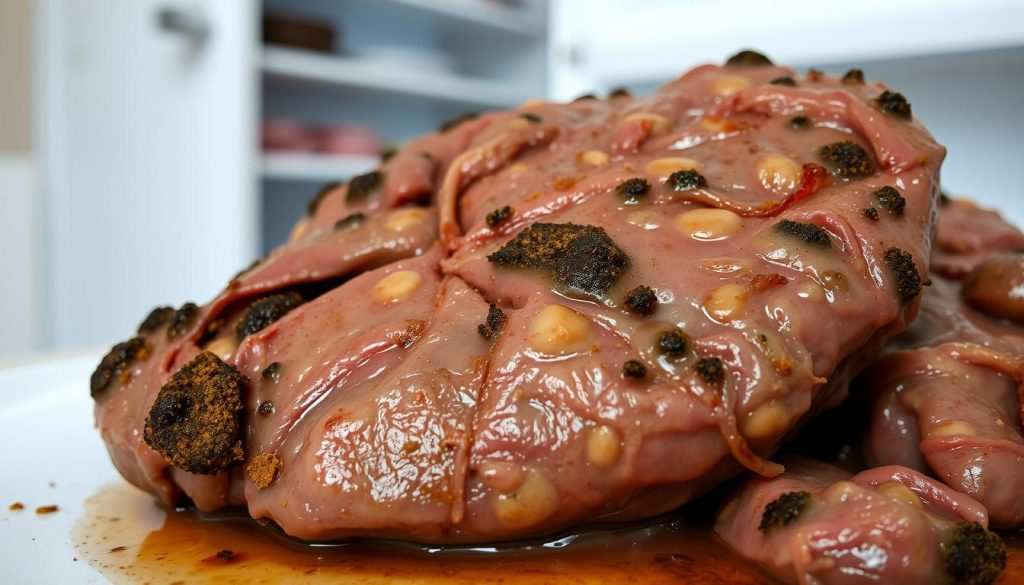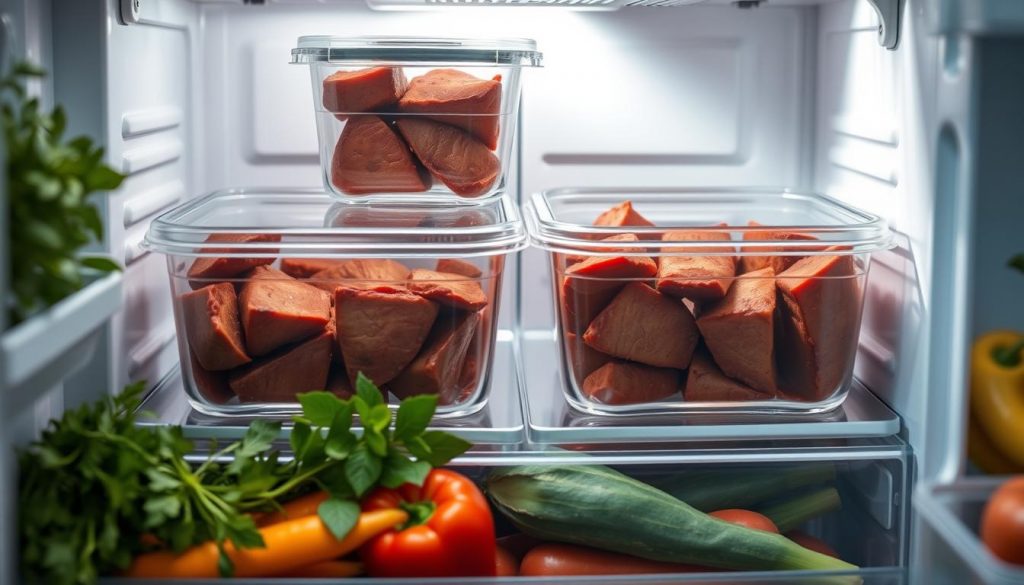Ever wondered how to handle leftovers? When it comes to cooked liver, knowing how to store it is key. Keeping your fridge food safe is important, and managing leftover liver is a big part of that. Proper storage stops food from spoiling and keeps it safe to eat.
It’s important to keep refrigerated meat at 40° F (4° C). This keeps it safe to eat.
Leftovers like cooked liver should stay in their original packaging. They should be eaten within a few days to stay fresh. Some foods can last up to 2 weeks, but liver is different. This shows how important it is to handle and store it correctly.
For more on storing and keeping cooked liver safe, check out our informational page.
Key Takeaways
- Properly stored cooked liver should be consumed within 1-2 days in the fridge.
- Maintaining a fridge temperature of 40° F (4° C) is key.
- Preserve the cooked liver in its original packaging to maximize freshness.
- Different meats have distinct refrigeration and freezer storage durations.
- Understanding the specific storage guidelines for liver is key for food safety.
Understanding the Refrigeration Process for Cooked Liver
Keeping cooked liver safe and fresh is key. This means controlling temperature, using the right packaging, and knowing how long it lasts in the fridge or freezer.
Why Temperature Regulation is Essential
Keeping liver cold is very important. It should be at or below 40°F (4°C). This cold keeps bacteria from growing, making the liver safer and fresher.
Make sure your fridge is at this temperature. It’s important for keeping liver good and safe from sickness.
The Role of Packaging in Preserving Liver Freshness
Good packaging is also vital for keeping liver fresh. It’s best to store it in its original packaging. This keeps air and harmful stuff out.
If you need to add more packaging, use airtight containers or vacuum-sealed bags. This helps keep the liver’s texture and taste better.
Comparing Refrigerator and Freezer Longevity
There’s a big difference between storing liver in the fridge and freezer. The fridge is good for short-term storage. But, freezing liver can make it last much longer.
In a freezer at 0°F (-18°C) or colder, liver can stay safe forever. But for the best taste, eat it within 3 to 4 months.
Knowing how to store liver properly is important. It helps keep it safe and tasty. This way, your meals can be both healthy and delicious.
How Long Does Cooked Liver Last in the Fridge
Knowing how long cooked liver lasts in the fridge is key for safety and taste. Storing cooked liver in the fridge is convenient but only for a short time. It stays good for three to four days if kept at 40°F (4°C) or lower. This keeps it safe from harmful bacteria and preserves its flavor and nutrients.
Let’s explore more about safe leftover storage to keep your cooked liver healthy for meals.
| Fridge Life | Description |
|---|---|
| 0-1 Days | Highly prone to spoilage unless frozen, not recommended for liver storage. |
| 1-2 Days | Acceptable if cooked liver is securely wrapped and stored promptly after cooking. |
| 3-4 Days | Ideal for retaining flavor and safety; optimal period for refrigerated liver shelf life. |
| 5+ Days | Not recommended: Risk of spoilage and bacterial growth increases significantly. |
The secret to longer refrigerated liver shelf life is in how it’s stored and cooked. Cooking it to 160°F (71°C) kills bacteria, a must before refrigeration.
Following these safe leftover storage tips keeps your cooked liver tasty and healthy. Enjoy it safely within the recommended time. Stay informed, stay safe, and enjoy your meals!
The Science Behind Spoilage: Bacteria and Cooked Liver
Knowing about food safety, like cooked liver spoilage, is key to avoiding sickness. Bacteria in food cause spoilage and health risks. It’s important to store food properly to stop these problems.
Fighting Bacterial Growth on Leftovers
To stop harmful bacteria on cooked liver, keep it cold. The USDA says there are two main types of bacteria to worry about. Cooked liver should be eaten within three to four days.
Keeping it cold stops bacteria from growing. Freezing meat at 0°F (-18°C) also kills microbes. This makes the meat last longer without being unsafe.
Identifying Spoilage: Signs Your Cooked Liver Has Gone Bad
It’s important to know when liver has gone bad. Spoilage in meat like liver shows up as texture, smell, and color changes. If it’s slimy, smells bad, or looks different, throw it away.

In short, keeping food safe means storing it right and knowing when it’s bad. Following these tips helps keep you and your family healthy.
| Storage Method | Shelf Life | Temperature |
|---|---|---|
| Fridge (cooked liver) | 3-4 days | Below 40°F (4°C) |
| Freezer | Indefinite at 0°F (-18°C) | 0°F (-18°C) |
| Room Temperature | 2 hours max | Above 40°F (4°C) |
Maximizing Liver Shelf Life: Tips and Tricks
To extend liver shelf life and maintain liver freshness, follow some key food preservation tips. Proper storage not only boosts flavor but also preserves nutrients. Here’s how to keep liver fresh and tasty for longer.
First, store liver in the coldest part of your fridge right after buying or cooking. Wrap it in aluminum foil or use an airtight container. This stops air from spoiling the liver.
- Airtight storage: Vacuum-sealed bags or containers greatly reduce air exposure, slowing spoilage.
- Refrigeration: Cold temperatures prevent bacteria growth and keep freshness.
Check out this detailed guide for more on liver storage. It covers various types, temperatures, and tips.
| Type of Liver | Storage Method | Estimated Shelf Life |
|---|---|---|
| Chicken Liver | Refrigerated, Airtight Container | 1-2 Days |
| Beef Liver | Refrigerated, Airtight Container | 2-3 Days |
Different liver types last longer, with beef liver lasting more than chicken liver. These tips help preserve liver better, improving safety and quality.
Always check liver’s look and smell for freshness. Bad smell or sliminess means it’s time to throw it away. Simple steps can greatly improve extending liver shelf life and our meals.
Freezing Cooked Liver: A User’s Guide
Freezing is a great way to keep our favorite dishes fresh. This guide will show you how to freeze cooked liver. It keeps the dish tasty and healthy for longer.
To Freeze or Not to Freeze: A Detailed Explanation
Freezing cooked liver is good for keeping it fresh longer than a few days. It’s best to use it within three months. But, for the best taste and texture, use it in one to two months.
Wrap the liver tightly in foil or use a heavy-duty freezer bag. This prevents freezer burn. Also, label the package with the freezing date to keep track of it.
Proper Thawing Techniques for Liver
Thawing is as important as freezing. The best way is to thaw it in the fridge slowly. This keeps the liver’s texture and flavor good.
Thawing can take hours or overnight. For a quicker thaw, use cold water. Change the water every 30 minutes. Cook the liver within a day or two after thawing.
| Method | Duration | Effectiveness |
|---|---|---|
| Refrigerator Thawing | Up to 24 hours | High – Retains most original flavor and texture |
| Cold Water Thawing | 2-3 hours | Medium – Faster but requires attention to water change |
By following these tips, you can enjoy your liver dishes longer. Freezing and thawing help keep the liver tasty and healthy.
Health Benefits of Properly Stored Liver
Keeping liver stored right is key to getting its health perks. It makes sure this food boosts your diet well. When stored right, liver is not only good for you but also tastes great and feels nice in your mouth.
Nutritional Impact of Liver on Your Diet
Liver is packed with nutrients that are great for our health. For example, 100g of beef liver has 20g of protein, which helps muscles grow. It also has lots of Vitamins A and B12, which help our eyes and brain work well.
This makes liver a top choice for getting the right mix of vitamins and minerals. It helps keep our body healthy and strong.
How Storage Affects Liver’s Nutrients
How we store liver matters a lot. Keeping it in the fridge right helps keep its nutrients fresh. But, it’s best eaten within 1-2 days to keep it at its best.
Freezing is a better option to keep liver good for longer. It can stay frozen for 3-4 months without losing too much of its nutrients. This way, you can enjoy liver’s health benefits whenever you want.
Here’s a comparative analysis to emphasize the importance of proper liver storage:
| Nutrient | Content in Fresh Liver (per 100g) | Content After 2 Days in Fridge | Content After 3 Months in Freezer |
|---|---|---|---|
| Protein (g) | 20 | 20 | 19.5 |
| Vitamin A (IU) | 17,000 | 16,500 | 16,000 |
| Vitamin B12 (µg) | 60 | 59 | 58 |
| Iron (mg) | 4.9 | 4.8 | 4.7 |
| Fat (g) | 4 | 4 | 3.9 |

Knowing how to store liver right helps us get the most out of it. This way, every time we eat liver, it’s full of nutrients and good for our health.
Food Safety: Best Practices for Handling Cooked Liver
Keeping cooked liver safe starts with good cooked liver handling and following food safety practices. It’s key to fight liver food poisoning prevention. We stress the importance of how liver is cooked and stored after cooking.
After cooking, store liver in the fridge at 40°F (4°C). This stops harmful bacteria from growing. This way, liver stays safe to eat for 1 to 2 days. Our tips help keep your liver dishes tasty and safe for you.
| Food Item | Refrigeration (1-2 Days) | Freezing (3-4 Months) |
|---|---|---|
| Cooked Liver | Yes | Yes |
| Variety Meats (e.g., kidneys, heart) | Yes | Yes |
| Leftover Cooked Poultry Dishes | 3 to 4 Days | 4 to 6 Months |
| Fresh Meat (inc. Liver) | 1 to 2 Days | Yes |
Following these storage tips keeps your cooked liver fresh and safe. Cook all food to 75°C to kill bacteria. This, along with good cooked liver handling and strict food safety practices, helps prevent liver food poisoning prevention.
Also, cool leftovers fast, in one to two hours, and eat them within the time limits. This careful handling and reheating lowers food waste and illness risks.
Food Poisoning Prevention: The Importance of Monitoring Liver Storage Time
Foodborne illnesses affect nearly one in ten people every year. This highlights the need for preventing food poisoning by monitoring liver storage. It’s key for safe liver consumption and health.
Unsafe food handling leads to many illnesses. Children under five and the elderly are most at risk. Liver, being nutrient-rich, needs careful storage to avoid bacterial growth.
Storing cooked liver in the fridge quickly and eating it within 3 to 4 days lowers contamination risk. Keeping the fridge at 40°F (4°C) or below ensures liver safety and quality.
| Storage Tip | Impact |
|---|---|
| Refrigerate within 2 hours of cooking | Minimizes bacterial growth |
| Keep at 40°F (4°C) or below | Preserves freshness and prevents spoilage |
| Consume within 3-4 days | Reduces risk of foodborne illnesses |
Staying alert about liver storage is essential for safe liver consumption. This practice not only prevents food poisoning but also keeps liver’s nutritional value. It ensures the health of you and your family.
Liver Reheating Methods for Quality Retention
We know reheating liver right means keeping it juicy and safe. It’s key to heat it to kill bacteria but not overcook. Aim for a temperature between 145°F and 160°F for the best taste and safety.
Techniques to Safely Warm Up Your Liver Leftovers
The stovetop is best for reheating liver safely and tastily. Heat it gently in a saucepan with sauce or broth. This adds flavor and keeps it moist. Try gravies or wine reductions for a rich taste.
Remember, don’t heat too high. This can make the liver tough and lose its flavor.
Keeping the Flavor Alive: Reheating Without Quality Loss
Flavor retention doesn’t mean sacrificing safety or quality. Reheat the liver slowly, covered on low heat. This keeps it moist and flavorful.
Microwaving is quick but can cook unevenly. Be patient to keep your liver as tasty as the first time.




